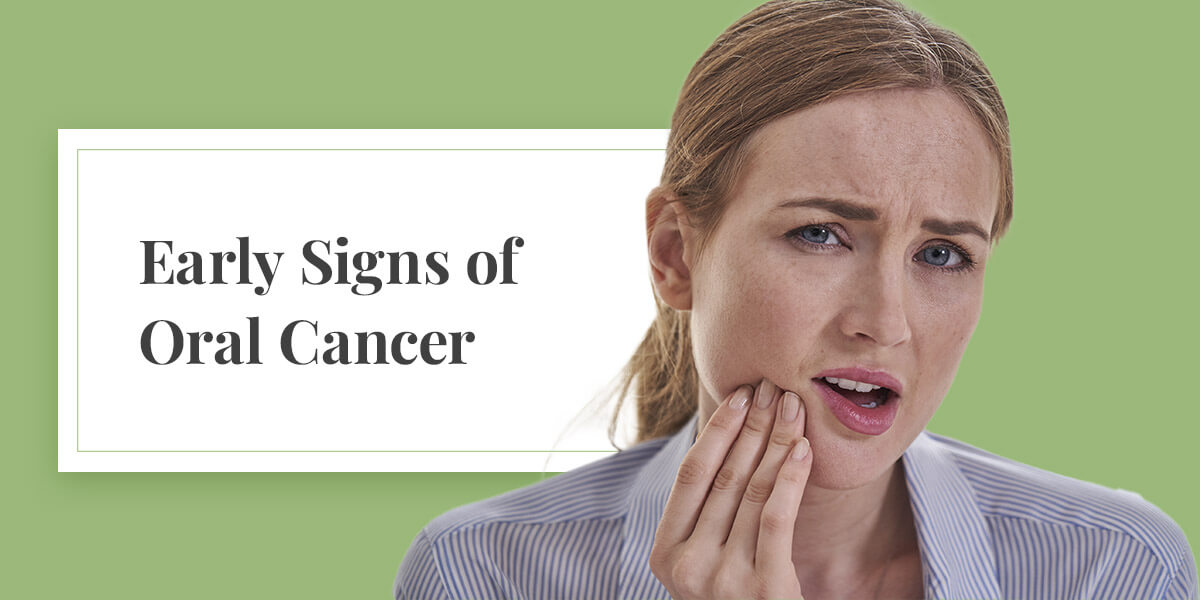What Are the Early Signs of Oral Cancer?

Oral cancer occurs when cells in the mouth grow uncontrollably. It can affect areas like the cheeks, tongue, or gum tissue.
About 11 out of every 1,00,000 people will get oral cancer in their lifetime, with men at a higher risk than women. White individuals have a higher chance of developing oral cancer compared to Black individuals. Despite these statistics, 63% of people diagnosed with oral cavity cancer survive for at least five years.
This blog discusses the early signs of oral cancer to help you recognize them, potentially saving lives by improving the chances of successful recovery.
What is Oral Cancer?
Oral cancer is a type of cancer that develops in the tissues of the mouth or throat. It can occur on the lips, gums, tongue, roof or floor of the mouth, and the inner lining of the cheeks. Precancerous lesions often precede oral cancer, which can progress to cancer if not treated.
Risk factors for oral cancer include tobacco use, heavy alcohol consumption, human papillomavirus (HPV) infection, and prolonged sun exposure. Left untreated, oral cancer can spread throughout your mouth and throat to other areas of your head and neck.
Dr. Sumant Gupta is a renowned oncologist specializing in oral cancer treatment. With years of experience, he has become a leading authority in India, known for his expertise in advanced surgical techniques and personalized care.
Dr. Gupta’s holistic approach addresses not only the physical aspects but also the emotional and psychological needs of his patients. His commitment to excellence and compassionate care has earned him respect both nationally and internationally.
What Are the Early Warning Signs and Symptoms of Oral Cancer?
Oral cancer can manifest through various signs and symptoms, indicating the need for prompt medical attention. The early warning signs of this cancer include:
- Difficulty Chewing or Swallowing: This could indicate a tumor in the throat or esophagus, making it challenging to move food from the mouth to the stomach.
- Lump or Sore Area: The presence of a lump, thickening, or sore area in the mouth, throat, or on the lips could be a sign of oral cancer.
- White or Red Patch: A white or red patch in the mouth that does not heal or go away could indicate abnormal cell growth.
- Difficulty Moving Tongue or Jaw: Oral cancer can affect the mobility of the tongue or jaw, leading to problems in speech and chewing.
- Unexpected Weight Loss: Unexplained weight loss without changes in diet or exercise habits could be a symptom of oral cancer or other underlying health issues.
- Persistent Sore or Ulcer: A healthcare professional should examine a sore or ulcer in the mouth that does not heal, bleeds easily or becomes painful.
- Tenderness, Pain, or Lumps: Any persistent tenderness, pain, or lumps in the mouth or on the lips should be evaluated by a healthcare provider.
While these symptoms may not always indicate cancer and could be related to other conditions, it is crucial to have them evaluated by a healthcare professional if they persist for more than two weeks.
Dr. Sumant Gupta emphasizes the importance of recognizing early signs of oral cancer. He advises, “Be vigilant for any persistent changes in your mouth, such as mouth sores, white or red patches, or difficulty chewing or swallowing. These symptoms may seem minor, but they could indicate a serious issue. If you notice any of these signs, don’t hesitate to seek medical advice promptly. Early detection can greatly improve treatment outcomes.”
Why is Early Detection so Important?
In most forms of cancer, early diagnosis is crucial. Treatment for oral cancer usually involves using a combination of therapies, such as radiation therapy and chemotherapy together, which are much more effective in the early stages. If the cancer has spread to other areas, it becomes much more difficult to isolate and treat.
If cancer has not spread to surrounding tissues, the 5-year survival rates for oral cancer of the lip, tongue, and floor of the mouth range from 75 to 93 percent. These figures fall if the cancer has spread to surrounding tissues.
Anjali Sharma, a happy patient of Dr Sumant, shared, “I was terrified when I noticed a persistent sore in my mouth that wouldn’t heal. Dr. Sumant Gupta’s expertise and compassionate care reassured me. His early diagnosis and treatment plan saved my life. I can’t thank him enough.”
Raj Singh, another happy patient of Dr Sumant, mentioned, “Dr. Sumant Gupta’s thoroughness in examining my oral health detected early signs of cancer. His prompt action and treatment regimen cured me and restored my faith in healthcare. I am forever grateful.”
How Much Does it Cost to Cure Oral Cancer in India?
The cost of treating oral cancer in India varies considerably based on the stage of the disease, the type of therapy needed, the hospital or facility chosen, etc. Surgery, chemotherapy, and radiation therapy might cost anywhere between INR 2,00,000 and 10,00,000 or more ($2,700 and $13,500).
However, these are preliminary estimates, and actual expenses may differ significantly. Therefore, consulting with healthcare providers and facilities is essential to get specific cost estimates for individual cases.
Conclusion
Recognizing the early signs of oral cancer is crucial for timely diagnosis and effective treatment. Symptoms such as mouth sores, white or red patches, and difficulty chewing or swallowing should not be ignored and should prompt a visit to a healthcare professional.
Early detection significantly improves the chances of successful treatment and survival. By being aware of these signs and seeking prompt medical attention, individuals can take control of their oral health and potentially prevent the progression of oral cancer.
FAQs
1. Is oral cancer hereditary?
While most cases of oral cancer are not hereditary, there may be a genetic predisposition in some cases. It is essential to discuss your family history with your healthcare provider.
2. Can oral cancer be prevented?
While not all cases can be prevented, avoiding tobacco and alcohol use, practicing good oral hygiene, and getting vaccinated against HPV can reduce the risk.
3. How is oral cancer diagnosed?
Diagnosis usually involves a physical exam, biopsy, and imaging tests like X-rays or CT scans.
4. What are the treatment options for oral cancer?
Treatment may include surgery, radiation therapy, chemotherapy, or a combination of these, depending on the stage and location of the cancer.
5. What is the prognosis for oral cancer?
The prognosis depends on the stage of the cancer at diagnosis. Early detection and treatment can significantly improve the chances of survival.
Explore more blogs: What is Ovarian Cancer? Its Symptoms, Detection, and Treatment
